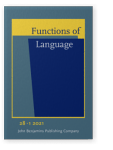Vol. 28:1 (2021) ► pp.27–54
Presupposed evaluation in environmental argumentative discourse
Expressions of evaluation in discourse have been studied from a number of different perspectives, all highlighting the fact that evaluation may be expressed cumulatively, through a combination of different linguistic means, and pragmatically, at various levels of implicitness, which often defy precise categorization. This paper argues that, in argumentative discourse, the pragmatics of evaluation includes not only implied but also presupposed aspects. A case study centred on the environmental debate over the contested practice of fracking is used to identify the evaluative premises that lie behind the main stances or claims on the issue, as expressed by different stakeholders. It is argued that this wider approach to the analysis of evaluation may be particularly suited to uncover the evaluative premises that lie at the core of different and often contradictory environmental positions and policies.
Article outline
- 1.Introduction
- 2.Evaluation in discourse
- 3.Evaluation, register and argumentation
- 4.Evaluation in environmental argumentation: A case study
- 4.1Analysis of viewpoints
- 4.2Summary of analysis and findings
- 5.Discussion
- 5.1Theoretical implications and further research
- 5.2Environmental deliberation
- 6.Concluding remarks
- Notes
-
References
